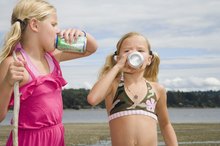What does fact checked mean?
At Healthfully, we strive to deliver objective content that is accurate and up-to-date. Our team periodically reviews articles in order to ensure content quality. The sources cited below consist of evidence from peer-reviewed journals, prominent medical organizations, academic associations, and government data.
- NCBI: Risk of colon cancer and coffee, tea, and sugar-sweetened soft drink intake
- NCBI: Risk of colon cancer and coffee, tea, and sugar-sweetened soft drink intake
- National Institutes of Health: Irritable Bowel Syndrome
- National Institutes of Health: Constipation
The information contained on this site is for informational purposes only, and should not be used as a substitute for the advice of a professional health care provider. Please check with the appropriate physician regarding health questions and concerns. Although we strive to deliver accurate and up-to-date information, no guarantee to that effect is made.
Diet Soda & Colon Problems
The good news from research is that diet soft drinks are not associated with increased risk for any form of cancer, including colon cancer. Neither are soft drinks sweetened with sugar 2. The not-as-good news is that heavy consumption of the beverages sweetened with aspartame -- better known as NutraSweet and Equal -- may contribute to other health conditions.
If you are experiencing serious medical symptoms, seek emergency treatment immediately.
Study Acquits Aspartame
MSNBC.com might have said it best 2006 when it reported, “A huge federal study in people -- not rats -- takes the fizz out of arguments that the diet soda sweetener aspartame might raise the risk of cancer.” A study that concluded in Italy one year earlier -- confined to 1,800 lab rats -- had provided different and disturbing results 1. Among the female rats that consumed aspartame, the incidence of leukemias and lymphomas was greater. However, the American study in 2006 involved humans, many humans. Ages 50 to 69, there were 226,945 women and 340,045 men. During the five-year project, 2,106 developed blood-related cancers such as lymphoma or leukemia, and 376 developed brain tumors. But researchers identified no cause and effect between ingesting aspartame and those cancers. National Cancer Institute researchers conducted that National Institutes of Health and AARP project.
- MSNBC.com might have said it best 2006 when it reported, “A huge federal study in people -- not rats -- takes the fizz out of arguments that the diet soda sweetener aspartame might raise the risk of cancer.” During the five-year project, 2,106 developed blood-related cancers such as lymphoma or leukemia, and 376 developed brain tumors.
Sugar-Sweetened Soft Drinks
Cholesterol & Diet Soda
Learn More
While obesity is a risk factor for colon cancer, sugar-sweetened soft drinks have also been released from charges of contributing to colon cancer 2. The results of 13 North American and European studies were evaluated in 2010 at the Harvard School of Public Health. The Journal of the National Cancer Institute reports that, of the 731,441 participants in those studies, only .7 percent contracted colon cancer.
But Wait!
MSNBC.com reports that the Center for Science in the Public Interest worries that people drink diet soft drinks so they can over-indulge at dessert time. Worse, there may be other medical conditions that can be attributed to drinking diet soft drinks. The New York Times reports a relationship with metabolic syndrome 3. Risk factors such as high blood pressure, blood glucose and cholesterol can result in diabetes or heart disease. In fact, study participants showed a 34 percent increased risk by drinking just one diet soft drink serving a day.
- MSNBC.com reports that the Center for Science in the Public Interest worries that people drink diet soft drinks so they can over-indulge at dessert time.
- In fact, study participants showed a 34 percent increased risk by drinking just one diet soft drink serving a day.
Other Colon Issues
The Side Effects of Drinking Diet Coke
Learn More
There are additional risks associated with soft drinks. The National Institutes of Health website reports that any carbonated beverage sweetened with sugar or aspartame may cause gas. Also, constipation sufferers may know they ought to drink between 48 and 65 ounces of liquids daily. However, they may not know that caffeinated liquids -- cola, coffee and tea -- and alcohol, dehydrate and curb the effects of other liquids.
- There are additional risks associated with soft drinks.
- Also, constipation sufferers may know they ought to drink between 48 and 65 ounces of liquids daily.
Just Don’t Binge
Introduction of aspartame to the food market 25 years ago doesn’t release you of the obligation to take good care of your health. Even in aspartame, there may be too much of a good thing.
Related Articles
References
- MSNBC: Artificial sweetener cleared of cancer link
- NCBI: Risk of colon cancer and coffee, tea, and sugar-sweetened soft drink intake
- NY Times: Symptoms: Metabolic syndrome is tied to diet soda
- Artificial Sweeteners and Cancer. National Cancer Institute. National Institutes of Health.
- Aspartame. American Cancer Society.
- Additional Information about High-Intensity Sweeteners Permitted for use in Food in the United States. U.S.Food and Drug Administration.
- Center for Science in the Public Interest. Chemical Cuisine. Learn About Food Additives.
- Qing Yang. " Gain Weight by “Going Diet?” Artificial Sweeteners and the Neurobiology of Sugar Cravings." Yale Journal of Biology and Medicine, June 2010.
Resources
Writer Bio
Nancy Varekamp has been a professional writer since 1973. She is an independent communications consultant who specializes in newsletters. Her editor positions have included Oregon weekly newspapers and a utility’s employee newsletter. Her work has also appeared in "The Oregonian" and in "Editor & Publisher." Varekamp earned a Bachelor of Science in communications from Lewis & Clark College.








